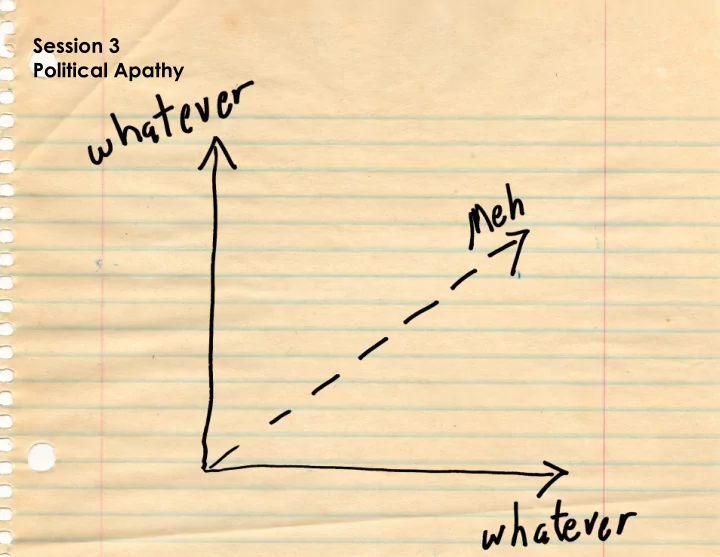

Session 3 Political Apathy 1
Why Bother Talking about Apathy? Origins of the issue in this course: � Why should there be any concern about apathy? � Is apathy problematic or is it promising? � What are some of the ultimate aims of political struggle? Could apathy serve as a shortcut to achieving those aims? � Is apathy apolitical? � “Can the apathetic speak?” � What interests are vested into making apathy an issue of concern, or a non-issue? 2
Popular (Mis)Conceptions of Apathy Wikipedia: “In 1950, US novelist John Dos Passos wrote: ‘Apathy is one of the characteristic responses of any living organism when it is subjected to stimuli too intense or too complicated to cope with. The cure for apathy is comprehension.’ US educational philosopher Robert Maynard Hutchins summarized the concerns about political indifference when he claimed that the ‘death of democracy is not likely to be an assassination from ambush. It will be a slow extinction from apathy, indifference, and undernourishment’.” 3
Random House Dictionary: ap•a•thy noun, plural ap•a•thies. 1. absence or suppression of passion, emotion, or excitement. 2. lack of interest in or concern for things that others find moving or exciting. 3. Also, ap•a•thei•a , ap•a•thi•a [ap-uh-thee-uh] Stoicism. Freedom from emotion of any kind. Origin: 1595–1605; (< F) < Latin apath ī a < Greek apátheia insensibility to suffering, equivalent to apathe - (stem of apath ḗ s ) unfeeling ( a + pathe- , variant stem of páthos ) + -ia Synonyms 1. coolness. 2. See indifference. Antonyms 1. ardor, fervor. 4
Encyclopaedia Britannica: apathy …in Stoic philosophy, condition of being totally free from the pathe , which roughly are the emotions and passions, notably pain, fear, desire, and pleasure. Although remote origins of the doctrine can probably be found in the Cynics (second half of the 4th century BC), it was Zeno of Citium (4 th —3rd century BC) who explicitly taught that the pathe were to be extirpated entirely. � lack of awareness � lack of social concern � lack of action, involvement � spectatorship � submission, rather than initiative 5
Political Apathy: Causes, Consequences, Solutions (?) Deluca, Tom. The Two Faces of Political Apathy . Philadelphia, PA: Temple Unversity Press, 1995. (1) individual responsibility for nonparticipation in the political process (2) a condition created by institutional practices and social and cultural structures that limit participation and political awareness Solution? Real political equality. 6
“the effective operation of a democratic political system usually requires some measure of apathy and noninvolvement on the part of some individuals and groups….In itself, this marginality on the part of some groups is inherently undemocratic, but it has also been one of the factors which has enabled democracy to function effectively.” [Huntington, Samuel P. (1975). “The United States.” In Michel J. Crozier, Samuel P. Huntington, and Joji Watanuki (Eds.), The Crisis of Democracy . New York: NYU Press, 114] George Will: the Nazis were brought to power in 1933 in an election in which turnout hit nearly 89 percent…implying acute instability. Low rates, therefore, may be explained by the health and maturity of a political order. [Will, George. (1983). “In Defense of Nonvoting.” Newsweek , October 10, 96.] Charles Krauthammer: “a leading indicator of contentment” + “more room for the things that really count: science, art, religion, family and play.” [Krauthammer, Charles. (1990). “In Praise of Low Voter Turnout.” Time , May 21, 88.] 7
“The history of American democracy and political thought is, in part, a history of the fear of democracy” (Deluca, 1995, p. 2) “In the United States activists come disproportionately from the better educated and more affluent” [Verba, Sidney, & and Orren, Gary R. (1985). Equality in America: The View from the Top . Cambridge, MA: Harvard University Press, 17.] “Apathy and lack of political skill are a consequence, not a cause, of the party structure and political culture….The political system determines whether participation is predicated on class-related resources and attitudes.” [Piven, Frances Fox, & Cloward, Richard A. (1989). Why Americans Don’t Vote . New York: Pantheon, 119.] For a selection of journal articles in anthropology, sociology and political science, dealing explicitly with “apathy,” see: http://tinyurl.com/boyoo7k Also, see our entry for Apathy on the course Concepts page: http://politicalanthro.wordpress.com/apathy/ 8
Recommend
More recommend